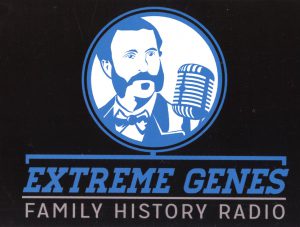 November is National Podcast Month, so this is the perfect month to share some favorite podcasts. Typically, a podcast is an episodic audio (sometimes video) program that can be downloaded online. Think of these as a form of talk radio in which you can choose when to tune in. The topics of the programming varies widely, so there are many that are useful and interesting to us as family historians.
November is National Podcast Month, so this is the perfect month to share some favorite podcasts. Typically, a podcast is an episodic audio (sometimes video) program that can be downloaded online. Think of these as a form of talk radio in which you can choose when to tune in. The topics of the programming varies widely, so there are many that are useful and interesting to us as family historians.
All posts by Kyle Hurst
Sisters as sources
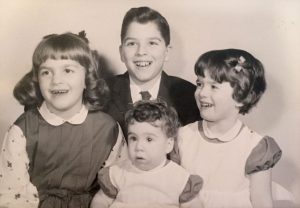
Each year, on the first Sunday in August, we celebrate National Sisters Day. Growing up together, we often take our sisters for granted. The older we become, the more we tend to cherish our shared experiences and the more we realize that our sisters (and the sisters in each generation) may hold the keys to learning more about our direct ancestors.
My sister and I share responsibilities as memory keepers for our family – but in unique ways. Continue reading Sisters as sources
Three words

Enjoyable, rewarding, and complex – three words that come to mind when I describe my work at NEHGS. As researchers and writers, we have the pleasure of making discoveries and documenting them for current and future generations. However, that comes with many responsibilities requiring juggling multiple projects. How can we keep track of so many research and writing projects while still giving our best efforts to each?
In answer, I offer three more words – conceptualize, organize, and prioritize. These are the actions that guide my work flow in order to maintain momentum on various projects – and they should be applicable to genealogical projects on any scale! Continue reading Three words
The Other Half
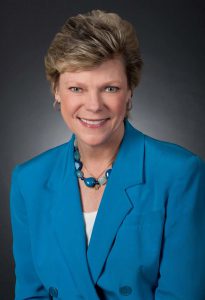
On October 27, NEHGS hosted a Family History Benefit Dinner featuring Bill Griffeth and Cokie Roberts, both accomplished news commentators and authors. Whereas Bill has written of his experiences with unexpected DNA results concerning his paternal side, Cokie has made a career of highlighting the lives of women in American history.
In honor of her accomplishments, the Society presented her with a Lifetime Achievement Award for History and Biography and a beautifully hand-bound book of her ancestors. As I compiled her robust genealogy, I worked to include the kinds of stories that would interest an author of female biographies. Continue reading The Other Half
“Ask a lady her age!”

For the past two weeks, many NEHGS staff members celebrated birthdays, bringing to mind my birthday celebration last year. At the restaurant, our waiter announced my birthday to the entire restaurant and led them in singing to me. While that was embarrassing, it was fine until he asked my age. I answered with the old adage, “You know, it’s not polite to ask a lady her age.” As a genealogist, however, that answer left me feeling disappointed in myself. Where would we be today if our ancestors always responded to that question in such a way? Continue reading “Ask a lady her age!”
The Sport of Genealogy

After a week of researching in Washington, D.C., with the NEHGS tour, one of the many things I have learned is that genealogy is more of a sport than a hobby. It takes physical and mental strength and endurance to pursue the ultimate prize of accurately identifying an ancestor. Continue reading The Sport of Genealogy
A Christmas box
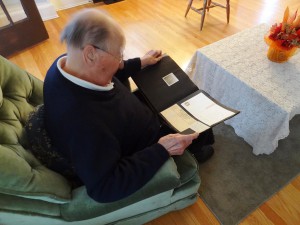
In this season of giving, sometimes the most enjoyment comes from sharing items you forgot you had instead of those newly received. Three years ago, I celebrated Christmas at the mountain home of my paternal grandparents. At some point, my grandfather mentioned to my father and aunts that he still had a box of their old vinyl records in storage. Naturally, they could not recall what might have been left over from their school days, and my cousins and I were curious about our parents’ musical tastes. We convinced my grandfather to dig out the box. Continue reading A Christmas box
Sprechen Sie Deutsch?
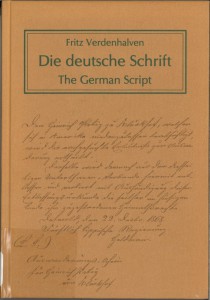
An article linked from The Weekly Genealogist had me thinking about how to conduct research in unfamiliar languages. I will soon receive eight microfilm reels containing German Catholic church records. The contents will be recorded in Latin, but key information could appear in German script. Sometimes it melds together to the point I’ve completely forgotten which language I am reading.
For the most part, church, and vital records adhere to a template, so even those of us who do not know the language can parse out facts pertinent to our ancestors. The key to accomplishing this feat lies in referring to guides to the language and/or records.
To help, Rhonda McClure has created a guide to German research for us. Some institutions post online translation tips and vocabulary lists. Brigham Young University offers some great script tutorials, and the FamilySearch wiki features a variety of language aids. Continue reading Sprechen Sie Deutsch?
A primer on current copyright law
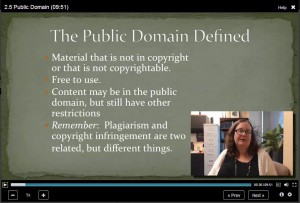
In this information age, many of us worry about others sharing pieces we have written, scanned, or recorded. What we may not consider, but should, is whether we ourselves have the right to use, donate, or sell certain items.
Recently, I participated in a four-week online course on copyright (for teachers and librarians) via Duke University. Meanwhile, my colleague Sally Benny attended a two-day education session during the Society of American Archivists (SAA) conference in Washington, D.C. Continue reading A primer on current copyright law